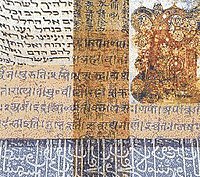Internet Sacred Text Archive
hideThis article has multiple issues. Please help or discuss these issues on the talk page. (Learn how and when to remove these template messages)
|
 | |
Type of site | Digital library |
|---|---|
| Owner | John Bruno Hare |
| Created by | John Bruno Hare |
| URL | www |
| Commercial | No |
| Registration | None |
| Launched | March 9, 1999 |
The Internet Sacred Text Archive (ISTA) is a Santa Cruz, California–based website dedicated to the preservation of electronic public domain texts, specifically those with significant cultural value. Works which fall into this category range from religious texts such as the Bible, the Qur'an, the Avestas, the I Ching, or the Vedas, to the classical literature of Virgil, Plato, or Sophocles, and on to the more contemporary works of Shakespeare, or the Brothers Grimm.
In addition, ISTA compiles texts of Native American religion, mythology and folklore, and lists historical texts and ethnographic accounts by culture group.[1] These texts were written from oral tradition by respected "ethnographers who were known for their careful and respectful approach to the people they studied."[2]
History[]
The website was first opened to the public on March 9, 1999 by John Bruno Hare (July 8, 1955 – April 27, 2010), in Santa Cruz, California, USA.[3] Hare started building the website from his home in the late 1990s, as "an intellectual challenge". At the time, he was working as a software engineer with a dot-com company, and started by scanning over 1,000 public domain books on religion, folklore and mythology [4] Its texts are organized into 77 different categories. The maintenance costs for the website—which as of 2006 received anywhere from five hundred thousand to two million visits a day—are funded by sales of the website on DVD, CD-ROM, or USB flash drive for monetary donations.[3]
See also[]
References[]
- ^ "Guide to Research in Native American Religions". University of Illinois at Urbana-Champaign. Archived from the original on 16 May 2013. Retrieved 15 November 2012.
- ^ Hare, John. "Native American Religions". ISTA. Retrieved 15 November 2012.
- ^ Jump up to: a b Hare, John. "About Sacred-Texts". Retrieved 2006-11-07.
- ^ "Sacred Pages". The New York Times. November 25, 2004.
External links[]
- The Internet Sacred Text Archive (archived versions: [1], [2])
- Remembering John Bruno Hare, Founder of Internet Sacred Texts Archive on YouTube
- 1999 establishments in California
- American digital libraries
- Companies based in Santa Cruz County, California
- Internet properties established in 1999
